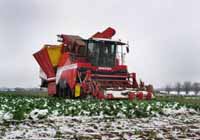Sugar beet harvesting set to last into March

The sugar beet harvesting campaign is set to drag on into early March again this year after frozen conditions delayed lifting in December.
This has raised concerns of seed-bed conditions for following crops, but no beet has yet been rejected.
British Sugar’s agricultural manager, Paul Bee, confirms that processing in the four beet factories (Bury St Edmunds, Suffolk, Cantley and Wissington, Norfolk, and Newark, Notts) has been affected by the recent freeze (Farmers Weekly, 17 December).
“We are pulling out all the stops to get crops processed,” he explains. “We have accepted all the crop so far, but sugar content has declined, as expected, after the coldest December for more than 100 years.”
The condition of harvested crops was “extremely varied”, he adds, and those which were not covered in snow and exposed to the cold appeared worst affected.
“Some crops have had the tops completely scorched off and they are often frozen the whole way through, but these crops can recover if the frost grows out,” he says.
However, many growers have now switched their concerns to the effect late-lifted beet crops will have on the following cereal crop.
Cambridgeshire beet grower Gabriel Bliss, who has a 4000t contract with British Sugar, lifted the remaining 20ha of his 42ha beet crop early last week. He says that conditions for hauling the beet out of the ground and loading it had been “horrendous” and fields had left been with severe ruts, which has made him question the sense of growing beet.
Mr Bliss, who farms near Wisbech, Cambridgeshire, says he would normally lift and clear all his beet by the first week of December, but the freezing conditions had forced him to leave it in the ground. “In 60 years of growing beet, I have never left it this long in the ground before, but the crop came out OK.”
Likewise, David Buck, co-owner of Jack Buck Farms in Spalding, Lincs, is also concerned by how ground conditions may affect his following wheat crop. “We don’t want to chew up the ground too much,” he says.
However, while Sean Sparling, a Lincolnshire-based AICC agronomist, says that it will be difficult to get a good seed-bed, he recommends growers drill the next crop as soon as practical and not be too concerned with ground conditions.
“When cereal prices are this good you cannot really afford to leave fields fallow for a winter crop, so any beet still left in the ground should be followed by spring barley or wheat.”
Most cereal and oilseed rape crops have emerged from the wintry weather with little more that superficial damage, but some oilseed rape crops in Yorkshire have been devastated by the conditions.
Philip Marr, technical development director for Masstock has seen four fields of oilseed rape annihilated by the icy blast and he is concerned that others could be similarly affected.
“I’ve been out to several northern growers to find whole fields of completely frost-blackened oilseed rape.”
Roots and shoots have turned to a “stinking mush” and the crops are a total write-off, he says.
As much of the country has been subjected to heavy frosts without snow cover, other growers could be affected, he warns.
At a casual glance, crops seem to be unharmed, but on closer inspection, leaves appear blackened, and when plants are pulled up, roots are black, says Mr Marr.
“Unlike last year, the crops hadn’t had the chance to harden off before they got hit by frost.”

